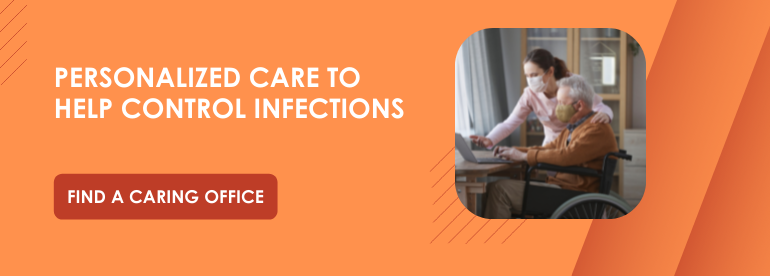The winter time can be tough for families. Cold weather means that everyone is stuck inside more, There’s not as much sunshine. And, unfortunately, there's a spike in many illnesses, ranging from the everyday cold to life-threatening pneumonia. Let’s review some of the most common winter illnesses for seniors and their families to watch out for.
Cold
Everyone has experienced the common cold. It can be caused by over 200 different viruses, but the most common is rhinovirus.
A cold is characterized by runny noses, low-grade fever, coughing, sneezing, and sore throat. But, generally, symptoms are very mild and don’t require medical treatment. Colds usually go away on their own within a week.
Colds spread easily in winter months because everyone is closer together. And the viruses that cause colds are spread through contact with infected mucus. For example, people with colds cough into their hands and then touch things like doorknobs and TV remotes. So, you can reduce your chances of getting sick with a cold by practicing good hand hygiene and taking other basic precautions.
Flu
The flu, or influenza, is another illness that’s more common in the winter. In fact, as many as 20% of Americans get the flu every year. The flu is an infection in your respiratory tract. Flu symptoms are more severe than cold symptoms and tend to include muscle aches and chills.
Individuals can receive antiviral medications to help with symptoms and reduce the duration of the infection. But, you have to get diagnosed within 48 hours of the first signs of symptoms for those medications to be effective.
The viruses that cause the flu evolve every year. That's why it’s recommended that you get a flu shot each year. The new vaccines are designed to target the most recent variations of the virus to help protect you from getting sick.
RELATED CONTENT: Are Your Senior Loved Ones Ready for Flu Season?
Pneumonia
Pneumonia is a lung infection. In the winter, it’s most commonly caused by a virus or bacteria. Individuals with pneumonia will likely have a cough with mucus, chest pain, chills, loss of appetite, a high fever, and trouble breathing. Seniors may also experience confusion or changes in mental state.
Pneumonia can be life-threatening in seniors or individuals with weakened immune systems. So, if you or a loved one thinks you have pneumonia, see a medical professional and start treatment as soon as possible.
To help prevent pneumonia, there are 2 vaccines available. These vaccines target the most common causes of pneumonia and can help protect seniors from this infection.
RSV (Respiratory Syncytial Virus)
RSV is a common concern for parents with new babies. However, it can be equally concerning for elderly adults, who are also at a high risk for severe RSV infections.
This infection affects the lungs and airways, causing difficulty breathing and wheezing or whistling with each breath. RSV can also include a runny nose, sneezing, coughing, and fever. But usually, these symptoms progress in stages and don’t appear all at once.
In healthy individuals, RSV symptoms may resemble a common cold. If you aren’t careful, you could spread RSV without even knowing it, putting loved ones at risk. So, it’s best to wash your hands frequently, disinfect common areas, and avoid close contact to family members with compromised immune systems.
Strep Throat
You might remember getting strep throat as a kid, but you can also get it as an adult. Strep throat is a bacterial infection. Symptoms of strep throat include difficulty swallowing, fever, and even a stomachache.
While you might think a sore throat is due to allergies, check your mouth before ignoring your symptoms. Strep throat often results in red and swollen tonsils, red dots on the roof of the mouth, and/or white patches of pus.
Strep throat is easily diagnosed with a quick swab test. If you do get strep throat, doctors can prescribe antibiotics to help knock out the infection quickly. Untreated strep throat may not go away on its own and can lead to serious complications, like kidney inflammation.
RELATED CONTENT: 9 Home Remedies for a Sore Throat
Norovirus
The winter vomiting bug, also known as norovirus, is a very contagious stomach bug that is most common from November to March. Norovirus is a food-borne illness that can cause both vomiting and diarrhea. It can also cause cramping, headaches, chills, and fatigue.
To decrease your chances of getting this stomach bug, make sure you wash your hands regularly. If you do get a stomach bug, make sure you drink lots of fluids to avoid dehydration.
Bronchitis
Bronchitis is an infection that causes inflammation in the bronchi, the large tubes that carry oxygen to the lungs. The main symptom of bronchitis is a continual cough that may produce phlegm. Other symptoms can include sore throat, headache, runny nose, fatigue, and body aches as a result of coughing so much.
This infection is common in the winter because it is caused by the same viruses that cause the cold or flu. It’s typical to get bronchitis after a common cold, a case of the flu, or even a sore throat. Bronchitis can be treated with non-steroidal anti-inflammatory drugs as needed.
COVID-19
COVID-19 took the world by storm a few years ago. This illness is caused by SARS-CoV-2 virus and can result in a wide range of symptoms, making it hard to identify in some individuals. The most common symptoms include fever, cough, fatigue, and loss of taste or smell. But it can also cause more serious symptoms, like shortness of breath and chest pain.
Luckily, at-home tests are widely available. So, you or a loved one can test for COVID if you start feeling under the weather. COVID is more likely to spread in the winter, as with other illnesses, because everyone is indoors and maintaining closer quarters.
If you or a loved one does get sick this winter, know that Caring Senior Service can help. While you’re not feeling well, we can run errands, do household chores, make meals that sound good, and more. Just reach out to a Caring office near you to learn more.


